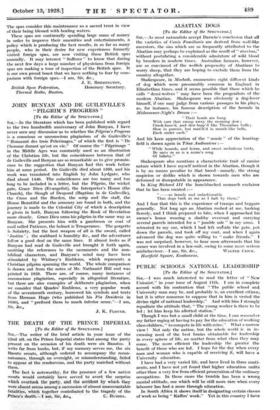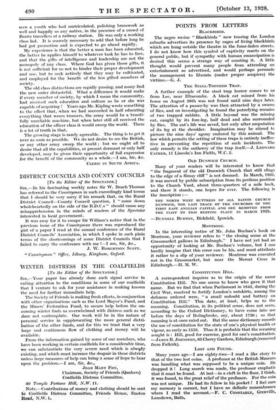accord with his contention that " The public school 'and
University man may be, and probably is, an excellent citizen; but it is utter nonsense to suppose that in him is vested the divine right of national leadership." And with him I strongly repudiate the attitude that, " The young worker is there to be led ; let him keep his allotted station."
Though I was but a small child at the time, I can remember my father raging at having to pay for the education of working class children, " to compete in life with mine." What a narrow view ! Not only the nation, but the whole world is in in- creasing need of the best brains obtainable for leadership in every sphere of life, no matter from what class they may come. The more efficient the leadership the greater the
benefit of those who are led. I hope for the day when every man and woman who is capable of receiving it, will have a
University education.
I have had a very varied life, and have lived in three conti-
nents, and I have not yet found that higher education unfits other than a very few from efficient prosecution of the ordinary occupations. In those cases the trouble has been a wrong mental attitude, one which will be still more rare When every labourer has had a more through education.
In South Africa it shows itself in designating certain classes of work as being " Kaffirs' work." Yet in this country I have seen a youth who had matriculated, polishing brasswork as well and happily as any native, in the presence of a crowd of Bantu travellers at a railway station. He was only a working class lad. It is scarcely necessary to add that before long he had got promotion and is expected to go ahead rapidly.
My experience is that the better a man has been educated, the better he applies himself to whatever task he has to face, and that the gifts of intelligence and leadership are not the monopoly of any class. Where God has given those gifts, it is not sufficient for us not to hinder their proper development and use, but to 'seek actively that they may be cultivated, and employed for the benefit of the less gifted members of society.
The old class distinctions are rapidly passing, and many find the new order distasteful. What a difference it would make if every member of society, by which I mean the community, had received such education and culture as he or she was capable of acquiring ! Years ago Mr. Kipling wrote something
to the effect that, when we had succeeded in half educating everything that wears trousers, the army would be a beauti- fully unreliable machine, but when later still all received the education of the officer class it would sweep the world. There is a lot of truth in that.
The growing stage is rarely agreeable. The thing is to get it over as soon as possible. We do not desire to see the British, or any other army sweep the world ; but we ought all to desire that all the capabilities, at present dormant or only half developed, may be given their opportunity of full expression for the benefit of the community as a whole.—I am, Sir, &c.
CLERIC IN SOUTH AFRICA.









































 Previous page
Previous page